Part 1: It matters how you think about the stress of learning, practicing, and performing MTB skills
Combining a stress-is-enhancing mindset with a growth mindset is the key
I get anxious if I have to give a speech or present via Zoom. My hands start to shake, and I often get diarrhea.
I get similarly anxious when competing in a sport, previously racquetball and mototrials, and more recently, mountain bike racing and pickleball.
I also get anxious when practicing (or showing off) MTB skills in front of others. And this anxiety kicks in just anticipating the experience, sometimes days and even weeks ahead of time.
Several weeks ago, the local Cub Scout pack leader planning a ‘bike rodeo’ for his kids asked me to talk to them about learning MTB skills and then demonstrate some skills and tricks. As soon as I agreed, I started getting nervous about it, hoping it would get canceled due to the weather.
Over the years, I’ve learned some breathing and muscle relaxation techniques to help minimize my stress levels in these situations, but I’ve never considered a different mindset about stress. I’ve always considered stress harmful.
But I’ve started to see it differently because of a couple of podcast episodes by two thought leaders I follow closely:
Trevor Ragan’s June 27 Learner Lab episode is titled Rethinking Stress: Why Stress Mindsets Matter. He interviews Dr. Kelly McGonigal and cites her book The Upside of Stress: Why Stress Is Good for You, and How to Get Good at It.
The second half of Andrew Huberman’s July 12 Huberman Lab episode focuses on the stress-is-enhancing mindset. He explains “why the growth mindset works synergistically with the stress-is-enhancing mindset and how to combine them.” He cites Dr. Alia Crum and her research paper Rethinking Stress: The Role of Mindsets in Determining the Stress Response (Journal of Personality and Social Psychology)
Essentially, the research says that if you believe that the stress of doing something hard is primarily harmful, it will likely be harmful when you experience it. Conversely, if you believe the stress of doing something hard is primarily helpful, it will likely be helpful when you experience it.
In other words, the specific thoughts—cognitive processes—you have about stress when doing something challenging (when making errors, anxious about performing, not getting the desired results, etc.) determine how it impacts you.
I just purchased Kelly McGonigal’s book The Upside of Stress: Why Stress Is Good for You, and How to Get Good at It.
It will take me some time to dig deeper into her book and Alia Crum’s research paper Rethinking Stress: The Role of Mindsets in Determining the Stress Response.
I want to understand the neurobiology of a threat response (fear, anger, self-doubt, shame) vs. a challenge response and recommend how best to apply strategies for MTB-related learning, practicing, and performing.
I’m excited about this because I put my primitive understanding of how to trigger a helpful challenge-type stress response for the Cub Scout pack demo last weekend, which I mentioned above. I wasn’t a nervous wreck in the days and hours prior. I enjoyed talking to them. And I did a decent wheelie at the end!
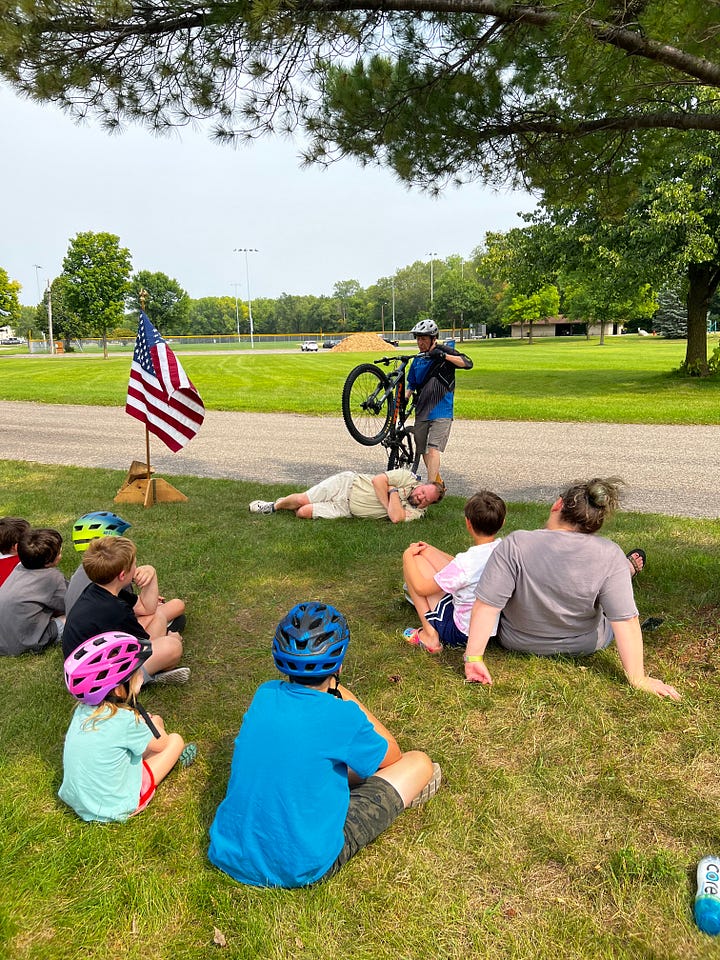
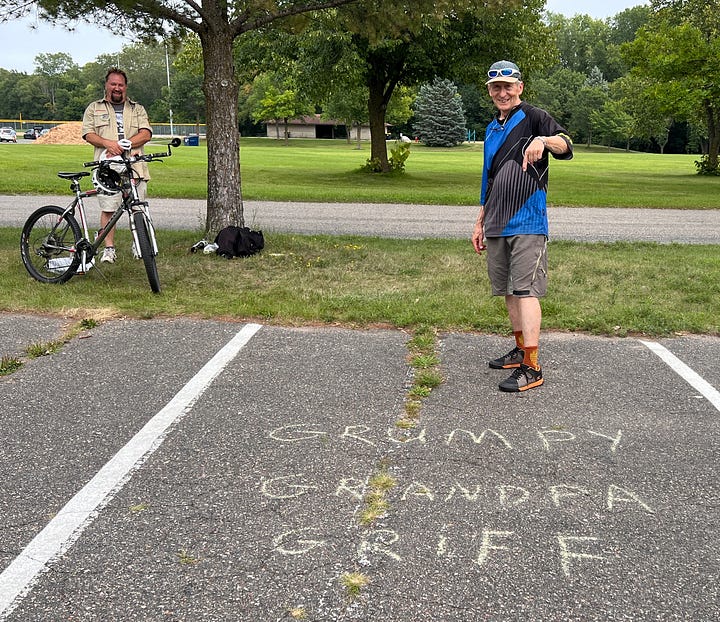
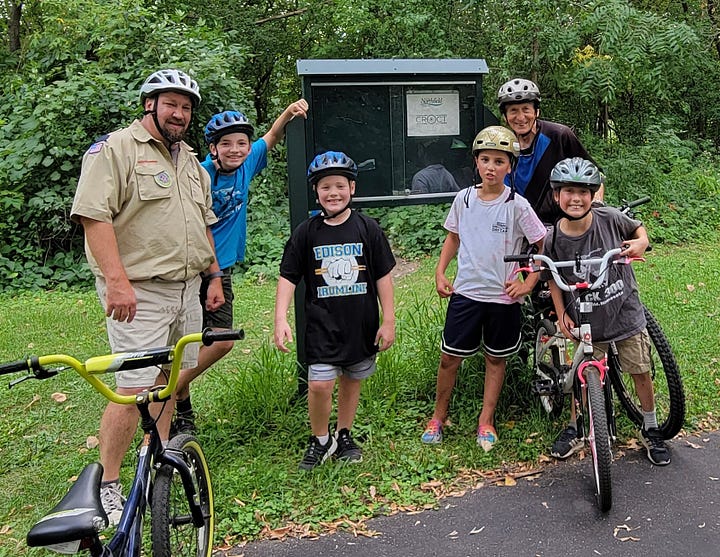
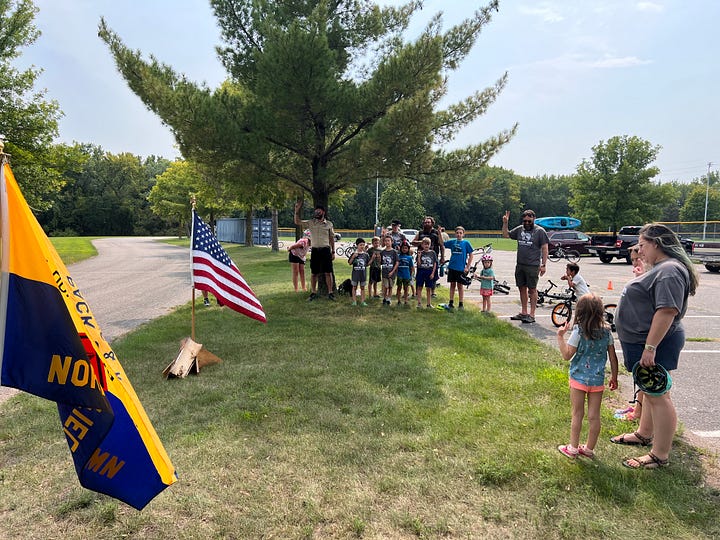
I remember those times when I attended MTB clinics, took my MTB coach certification training, went sessioning with a group of buddies, rode at a downhill MTB bike park for the first time, and recorded videos of me riding high skinnies. I initially reacted to all of those as if they were threats and not challenges. Likewise, I now think my initial ‘theat’ reaction to learning to do jumps, drops, wheelies, bunny hops, and manuals was not only due to the physical danger associated with those skills but also the fear of taking a hit to my self-image if I performed poorly.
Let me know your initial reaction to this Part 1 post about the stress response. And maybe tell us one of your own MTB-related stories about it:
If you enjoyed this post, consider sharing it.
If you’re liking the MTB Practice Lab on Substack, consider letting others know about it:
Your subscription details (free or paid):


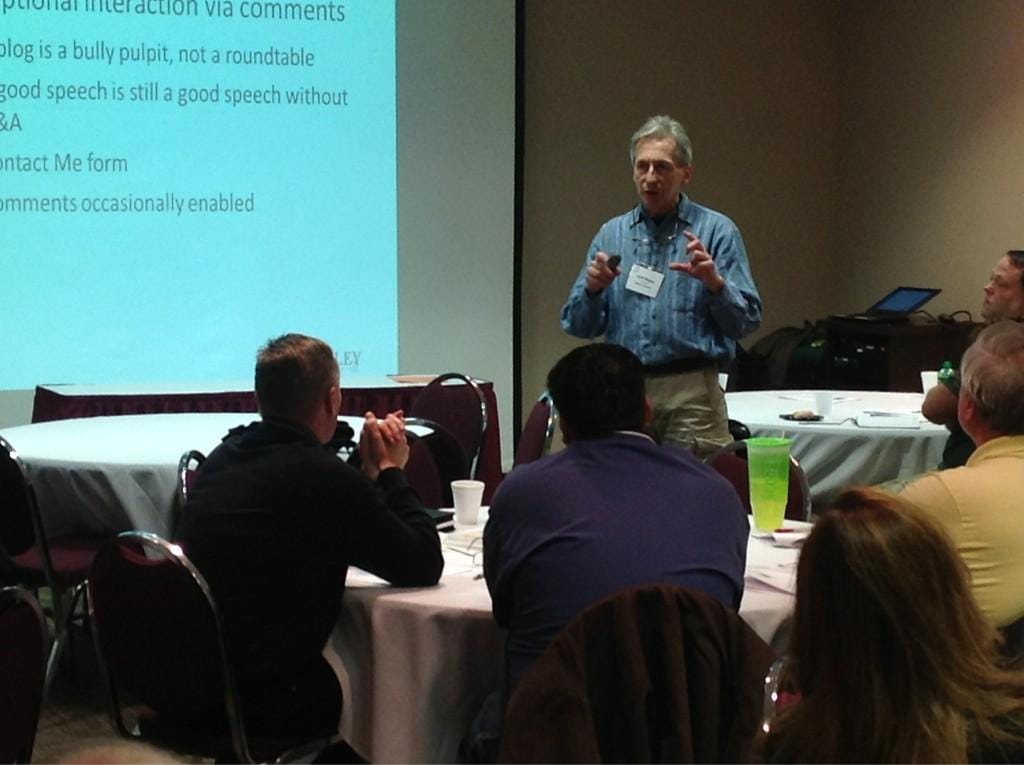
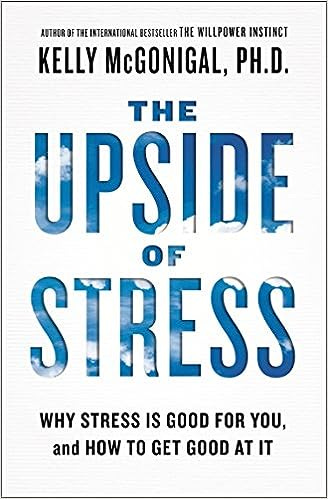
Lots to think about there Griff! Or should we call you Grumpy Grandpa Griff? :)
I suffer quite badly from stress both professionally and personally. Professionally I have learnt to feed off it and use it to help me perform well. I've had mentoring roles with some younger staff members and it is amazing how many of them were embaressed or stressed about being stressed and how relived they were when I shared my feelings with them. My standard line - if you're not stressed you don't care so why are you even here?
Personally I'm not so efficient. I've entered a few social MTB races with the intention of 'challenging myself' and although I generally enjoy the event, I often end up picking up a chronic injury as part of the preperation or event. And as the event approaches I get increasing nervous about letting myself down or showing myself up, to the point of broken sleep and nightmares. A few years ago I was trying to get fit enough to tackle a 4 day stage event in Tasmania called 'Wildside' and my wife woke me up one night as I was whimpering and pedalling my legs in my sleep. In my dream I was sprinting down a lane trying to escape a black dog that was shadowing me in the undergrowth.
I also generally only ride with close mates or alone and rarely join a social ride with people I don't know. And I struggle to attempt any skills that I am not very proficient at in front of anyone - I'm known to have a wide repertoire of trackstand variants but few other talents.
One other thing to consider about stress in general is whether it is self-imposed or put upon you. There is research known as the 'Whitehall Study' that found that stress amongst senior civil service management involved in significant decision making was much less than the underlings actually doing the work. One theory is that the stress response is due to a lack of control when a policy is passed down to you. Obviously MTB is largely the first one, but if you eg enter an event because you think you ought to it may lead to a different stress result than if you really want to.
Anyway, I've gone on too long. I like the idea of reframing stress and will add that book to the list - until then I look forward to hearing what you discover. And that bike rodeo looks like it was a heap of fun for everyone!
This is a huge amount of physiology/psychology to cover at one gulp!
I'd suggest treating the basic physiology (how the body works) before adding the complications of psychology (how we screw up how the body works).
Then ponder how we tend to over-simplify all such events by herding them into categories and making them fit a preferred picture. If we can honor the synergistic interactions involved ("organic"?), we can appreciate the interactions and complexities of our endeavors.
Basically........it takes "stress" (things working in motion) for anything to move. Otherwise you're "resting".
"Bad Stress" ("Distress"-Selye) is when the parts are working inefficiently and not getting the job done with minimal deterioration.
"Good Stress" ("Eustress" - Selye) is when the machine is working as smoothly as it can..........conserving energy as much as possible and keeping wear to a minimum.
Such functions are managed and controlled by electrical impulses and chemicals and are partly autonomic........they happen without conscious input. However we are learning more and more that the brain ("mind") has greater input than previously suspected, so that's where the psychology intrudes. Unfortunately our conscious input is often screwed up so we prevent our systems from functioning efficiently. We have invented the art and craft of psychotherapy to deal with this........along with a slew of medications, therapists, theories and interventions to join the dance.
The original, basic, idea was that, when presented with a voluntary, enjoyable, challenge in the great outdoors, all this would come together naturally and........Voila..........Mountain Biking!
When we are developing a new skill we need to learn the mechanics of the feature, our bike, our body (how much pedal force to use etc.) and some basic physics (like gravity). What we are looking for here is not to eradicate any kind of "stress", but to find an optimum, Goldilocks, mix (not too hot, not too cold).
If our mental processes are not ready for the challenge, we need to give them some consideration too. There may be a fly in the ointment or just some new interpersonal skills that need honing.
However, we need to watch that we give the amazing natural ingredients a chance to work their magic, with the minimum of interference from the stern guardian Out There............